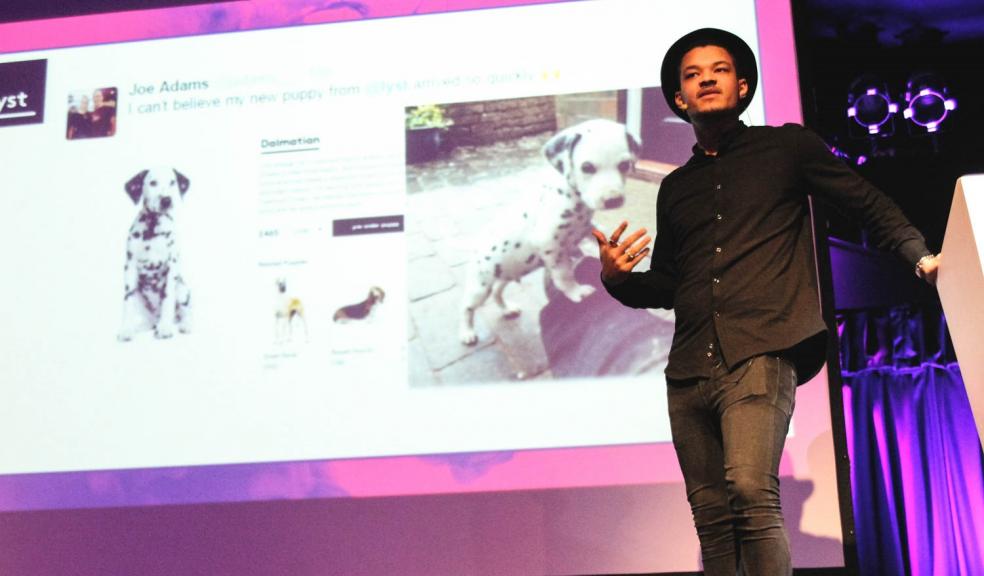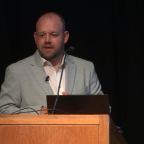
University drop out behind one of Britain's most influential companies
Steve Bartlett was expelled from school and later dropped out of university – after just one lecture - to set up an online business.
It was not an overnight success and he went hungry, struggled to cover his rent – and had letters mounting up from the bailiffs. His mother told him off for failing to commit to anything.
But in three years he has helped create one of Britain’s most influential companies - the multi-million pound Social Chain.
The 24-year-old said his relationship with his mother has never been better.
Steve, co-founder and CEO, shared his experience to a packed house of keen marketers at digital marketing conference, Digital Gaggle.
Speaking to an audience at the Lantern in Colston Hall, Bristol, he said he has learned lessons along the way.
He said: “Don’t fall into the dangerous trap of thinking anybody cares about you as much as you care about yourself.”
He referred to his first business, Wallpark, which was a website where students could reach out to others in the same city.
It failed to attract people’s attention when it first went live and Steve looked for better ways to promote it.
He said: “I realised I needed a real estate for somewhere which held people’s attention. I saw most people were on their mobile phones, but just for short periods of time.”
Steve, who was born in Botswana but raised in Plymouth, came across Dom McGregor, who had started up a social media page called Student Problems that went viral on Twitter.
The pair met at a pub and Steve told the audience he encouraged Dom to ‘drop out of university to help build big social media pages on Twitter’.
Social Chain has since bought up 400 social media accounts with huge numbers of followers and uses them as a means to advertise.
It can manipulate the topics or companies that trend on Twitter within minutes – and is said to be able to reach more than 300 million people with its viral marketing.
Social Chain has also pulled off several hoaxes which have gone viral, including the invention of a 16-year-old footballer who had been signed up by Arsenal for £34 million.
Today the firm has offices in Manchester, New York and Berlin and employs a team of 70 creatives with an average age of 21.
The underlying message was that Bristol businesses could find creative ways to reach their audiences online. Steve said: “You are not a marketer, you’re a publisher.”
Digital Gaggle
Digital Gaggle is a monthly meet-up at the Famous Royal Navy Volunteer in King Street and a bi-annual marketing conference.
Jon Payne, technical director of Bristol marketing agency and event organisers Noisy Little Monkey, said: “ We work hard to inspire delegates with a couple of high level talks and provide practical takeaways, with which they can improve their day to day marketing in others.
“Bristol is such a hotbed of technical creativity that the audience is pretty switched on. But I’m happy to report that one again, feedback for our sold out event has been incredible. We look forward to doing it all again in the autumn”
Jon Pitt, Managing Director of Somerset Design, sponsors the event. He said: “ The conference is fantastic – there are always great speakers and if you’re not part of it then you're missing out.
“Digital Gaggle gives delegates a wealth of free knowledge and you'll learn something new every single time. “
Guest speakers
The event also included talks from Tiffany Maddox, creative lead at Rubber Republic; Holly Edwards, digital account executive at Noisy Little Monkey; Drew Benvie, founder and MD of Battenhall; and Lisa Myers, CEO of Verve Search.
Tiffany Maddox, Rubber Republic
Tiffany, from the award winning content studio specialising in creating highly shareable video, opened the conference.
Tiffany, who has been behind several hit videos including Fiat: Welcome to the Motherhood (https://www.youtube.com/watch?v=eNVde5HPhYo), talked about ways to help make your video reach more people: being authentic, remarkable (people talking about the video), surprising and entertaining.
Tiffany, an early YouTube creator, said: “Entertain first. Don’t let the brand get in the way of the messaging. Try to make sure people are talking about your video without having to be paid or prompted.
“If you can show them something they’ve never seen before, or something better than they’ve seen before, it’s always going to be a powerful thing.”
Holly Edwards, Noisy Little Monkey
Holly, who manages the social media accounts of some of Noisy Little Monkey’s biggest clients, talked about ‘influencer marketing’ – where individuals with large followers on social media use their status to promote brands or products.
The digital account executive said: “In an age where 47 per cent of people use ad blockers, this type of trust marketing is paramount.”
Holly, who works with people who have millions of followers and leading UK bloggers, believes working with ‘micro influencers’ could be the way forward – for cost effectiveness.
Holly gave examples from real life Noisy Little Monkey campaigns - where working with small bloggers with engaged audiences provided significant success.
Drew Benvie, founder and MD of Battenhall
Drew has advised and represented corporations, global figures and brands worldwide, including Google, the BBC, Red Bull and the Financial Times. Named as the UK’s most respected practitioner by New Media Age, Drew talked about messaging apps.
He said the ‘story’, which was introduced by Snapchat and has since been rolled out by other social media platforms such as Instagram, was the future.
The ‘story’ is a photo or video you post to your own stories section of your account, which is visible to your friends.
Drew said: “The newsfeed is dead. Long live the ‘story’.”
He also talked about how WhatsApp Broadcasts are now used to share news stories by channels such as the BBC and was particularly popular in countries such as India. He said that WhatsApp Broadcasts may be difficult for users to initially subscribe to, but they had a high level of engagement.
He added: “We have seen the death of the demographic on social media. Everybody is on everything [every platform] – we just use them differently.”
Lisa Myers, Verve Search
Lisa, who set up her own SEO (Search Engine Optimisation) agency during the depth of the recession in late 2008, talked about the importance of mindset in creativity.
Verve Search is an award-winning international SEO agency, with a team of 25, serving six different countries.
But Lisa said their success was largely down to ‘passion, grit and hustle’.
She said: “You need to stand out and get to the ‘why’ [of your work]. Don’t accept being put into a box and told there are limits on what you can do.”
She talked about campaigns which had coverage in hundreds of publications and sites -thanks to collaboration and perseverance.
• For more information about Digital Gaggle and its monthly meet-ups, visit http://www.digitalgaggle.co.uk/













